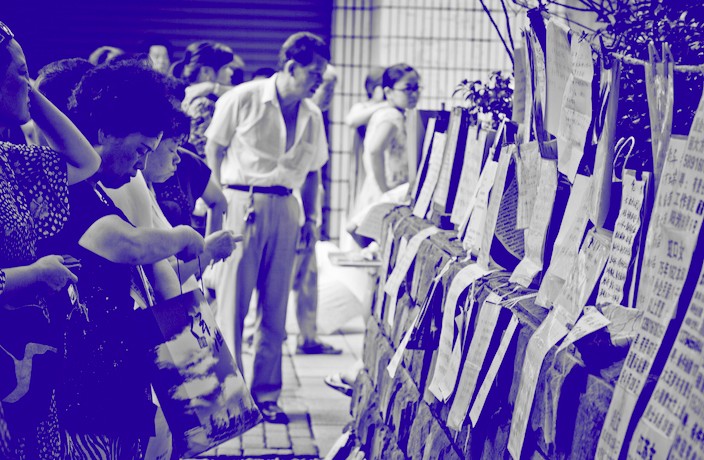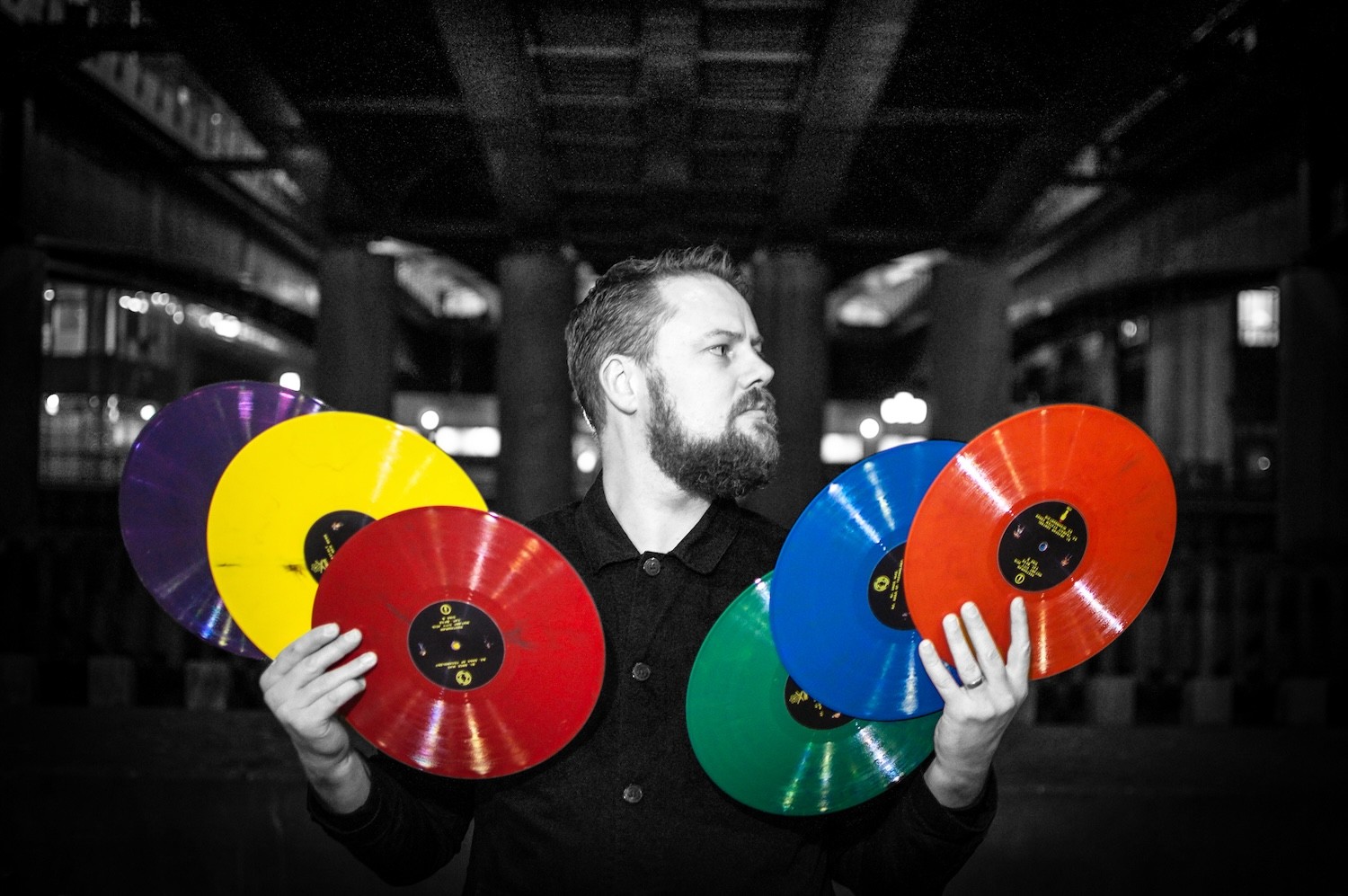This is part of our "Lonely Hearts Club: Tales of 21st Century Love in China" series. Read more about a Jiangxi man jilted by his Vietnamese mail-order bride here and the gay couples using apps to set up sham marriages here.
On a chilly Sunday morning, the People’s Park Marriage Market in Shanghai is packed with parents trying to find a suitable partner for their sons and daughters, and bothersome agents from matchmaking services.
Many are wary of our cameras. But one of the easier people to approach is Mr. Gu, a middle-aged matchmaker in a green army-style long coat and red cowboy hat.
“Feel free to take my picture,” Gu says as we approach his booth, which proudly displays hundreds of profiles of single men and women, listing their bios and contact information.
“It’s 100 kuai to have one of these posters up for six months,” Gu tells us between sips of bubble milk tea. “I will also put your information on my website; it will be there indefinitely.” To him, love is a business transaction, and the market is bustling.
It’s easy to identify the parents from the meddlers – they are generally more reserved. After putting up a short bio of their son or daughter on a wall or umbrella, they stand and watch from about 50 feet away. They engage with people only if they think there’s a possibility of finding a future son- or daughter-in-law.
"Dating in China is more formal because the parents of both sides are often involved; it's more goal-oriented. If you date without the goal of marriage in mind, they call it shualiumang — playing around."
We strike up a conversation with Mrs. Li from Liaoning. She’s a regular, and has a daughter born in 1988. According to the profile, her daughter is 1.66 meters tall, a white-collar worker at a foreign company, and is seeking a taller man with a Shanghai hukou who owns an apartment and “has no bad habits.” Our conversation soon turns into something between a census survey and a job interview.
When asked why she worries about her 27-year-old daughter’s inability to find a match on her own, Li replies: “I think most of the parents here are quite traditional and conservative, so their kids tend to be introverted. The parents are worried that they can’t find a partner. Here at the marriage market, they can scout out some reliable candidates.”
“Kaopu is a very important quality,” she states – ‘reliable.’
Li’s checklist includes age, hometown, hukou, salary, occupation and number of properties owned. To her, love is not so much a transaction as a matter of practicality.

Parents hunt for suitable partners for their children at the People's Park Marriage Market in Shanghai. Photos by Nicky Almasy.
This hardnosed approach can be less appealing to young singles in China, which are said to number 200 million. At a coffee shop in another part of Shanghai, I meet June, a confident, eloquent professional who, in the eyes of some, would be labeled a shengnü – “leftover woman.”
“It’s pretty annoying,” she says.
The term – which describes bachelorettes approaching, or over, the age of 30 – implies that people aren’t ‘good enough’ if they have yet to find a partner. But June is having none of it.
“My uncles and aunts kept asking about my plans for getting married,” she says of an awkward family dinner she recently endured. “I made up an excuse and left early.”
Turning 32 this year, June is not in a hurry to find a husband – nor does she find this particularly abnormal. “I think a lot of young women in China value their independence – being able to earn money and not relying entirely on men,” she says. “Some of my friends were pressured into marrying guys that weren’t compatible with them; these marriages didn’t last very long.”
She admits that her long work hours are the main reason why she’s still single. “The people who I see regularly are my employees and clients. The circle is very small. Some of my girlfriends have told me that men are intimidated by me,” she adds, referring specifically to her successful career and level of education.
The term ‘leftover women’ is misleading, argues Cai Yong, an expert on Chinese demographics and sociology professor at the University of North Carolina (UNC). “The assumption is that no one wants them,” she says. “In many cases, the reality is that many women are making the decision to hold out by choice because they can’t find men that match their criteria.”
Terms like shengnü stem from the cultural anxieties of older generations, Cai says. “China and other East Asian countries are ‘universal marriage societies.’ Men and women are expected to be married by a certain age.”
While people like June simply dismiss the label, there are others, like 33-year-old Wendy, who feel the pressure.
“[The term] piles unnecessary pressure on single women, on top of what we’re already experiencing from our families and society,” she says. “It’s unfair that only women have these labels, but sadly, it’s also true.”
From her late 20s, the Shanghai-born marketing manager started getting set up on dates with family friends. This is how, about a year ago, she met her current boyfriend – a British-born Chinese financial analyst who is three years her senior. After a short period of dating, they are now in a long-distance relationship, and Wendy is considering quitting her job and moving to the UK to live with him.
“It’s difficult because the identity and values of being a woman are changing. On the one hand, most women strive to be well-educated, smart and independent individuals,” she says. “But living in a place like China, where the traditional roles of men and women are still imposed upon us by society, these qualities might need to be dialed back when women are seeking a partner. It’s a tricky balancing act.”
Things are somewhat easier for single guys like Brandon, a financial consultant who was born in Shanghai and educated in the US. While he’s the same age as Wendy, his parents have a more relaxed attitude. To his friends, colleagues and most outsiders, he’s a bachelor, not ‘leftover.’
“In the industry I work in, it’s normal to be single. The work is so intense that you don’t have time to think about relationships,” Brandon says. “The attitude to dating in China is more formal because the parents of both sides are often involved; it’s more goal-oriented. If you date without the goal of marriage in mind, they call it shualiumang [playing around].”
But Chinese society is in transition, UNC’s Cai says. “The younger generation nowadays might not even want to participate in the blind dates that their parents arrange. But at the same time, they might also feel guilty for not following their parents’ wishes. [What we’re seeing] is the result of the rise of individualism [fighting with] traditional values.”
Mrs. Li from the Marriage Market might consider this bukaopu – unreliable.
Being single has its advantages – if not for the individuals, then for the companies who benefit from Singles’ Day (November 11), one of the world’s largest online shopping days. The people behind online dating websites like Jiayuan.com and Zhenai.com, also capitalize on the needs of China’s 200 million single adults (a number inflated by the country’s growing divorce rate). With millions of users across the country, these online matchmakers use criteria like age, hometown, and education to assess suitability – just like the Marriage Market at People’s Park, digitized.
"In the industry I work in, it's normal to be single. The work is so intense that you don't have time to think about relationships."
Founded in 2003 by Gong Haiyan from her university dorm room, Jiayuan.com is now the only Chinese dating website listed on the Nasdaq. Over the past 13 years, it has accumulated more than 160 million members. Its mobile app – the focus of the business since 2013 – has been downloaded more than 47 million times, says Executive Vice President Zhang Yahong.
“[Mobile products] helped us transition from being seen as a traditional matchmaker to a ‘relationship consulting provider,’” he explains. “[We] intend our marriage-oriented process to [cover] the whole dating process. It meets the younger generation’s needs. It’s a massive and everlasting market.”
The company’s financials suggest that this market is not only huge, but growing. Jiayuan’s net revenues reached RMB180 million in the second quarter of last year, a 23.9 percent increase from the same period in 2014. About 1.5 million users pay for the benefits of membership, spending an average of RMB24.1 a month (also up year-on-year). Nearly half of these registered users were born in the 1990s.
Co-founder and CEO of Zhenai.com, Li Song, says that keeping up with technological trends is one of the most important parts of his business plan. The site has recently launched a version of its app that is compatible with the Apple Watch. It can, among other things, monitor one’s heart rate during a date.
“The booming online dating industry is also affected by policy changes,” Li says, referring to China’s recent abolishment of the one-child policy. Nonetheless, he believes that the market will continue to thrive in the future.
A 27-year-old member of Zhenai.com, Ma, met his wife on it. He paid RMB10,000 in membership fees and spent about 30 minutes to an hour on the site every day before he found his match.
His wife was the third girl that had been introduced to him based on the site’s compatibility algorithms – they were from the same hometown and had been living in the same neighborhood. The two were married within six months of dating, and his wife has just given birth to their firstborn.
Ma initially joined Zhenai.com because of family pressure, though he had seen colleagues using the same service. His search was a successful one, for which he considers himself fortunate. “We were lucky because we had no interference from our families. Plus, both of us dated with the goal of getting married,” he says. “Not everyone was as lucky though. Not all my colleagues ended up finding someone.”
Regardless of whether matchmaking takes place in the park or online, luck still plays its part. Back at Shanghai’s Marriage Market, we find Mrs. Yang, a Shanghainese woman with a 34-year-old single daughter. Yang tells us she has been going to the market every Saturday and Sunday – from 8.30am to 4pm – for the past three years. Her voice is muffled by her facemask, but her pride in her daughter is clear enough.
“She’s too career-driven, and all of her colleagues are married,” Mrs. Yang says. “She has very high standards, too.”
This is meant as a compliment, though there’s a hint of remorse to her words.
When asked about her ideal son-in-law, Mrs. Yang says: “Good personality and temperament is important… She’s our only daughter. The most important thing is that the guy must treat her well and love her. I just want her to be happy.”






















0 User Comments